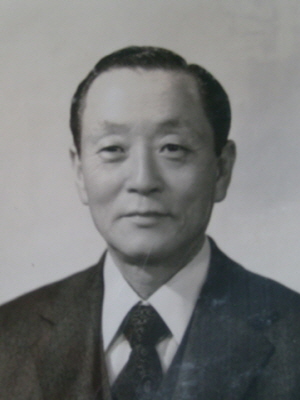Our Great Father
아버지의 자랑스러운 생애
 A proverb says, "He who leaves the fame of good works after him does not die."
A proverb says, "He who leaves the fame of good works after him does not die."
A man wants to leave his name, so he engraves his name on the rocks of mountains.
Our father is not such a man who leaves the fame of good works nor has his name being posted on the newspaper.
However, it's true that everyone need not, or cannot, be a brave fighter nor a millionaire.
The man who is necessary and welcome in the modern society is a person who carries out his responsibility and would not do harm to others. It is more so in the democratic society that values high the individual person and family.
From this point of view, our father has lived a life which we are proud of.
His life coincides with the vicissitudes of the modern history of Korea which is full of blood, sweat and tears.
He was born in 1912. His future was restricted at large under the Japanese occupation until 1945. Throughout the years of the Independence from the Japanese rule and the Korean War, he survived the risk of ideologies. As a matter of fact, his brother, a principal of the elementary school in the outskirts of Jeonju was slain by communists during the war.
Because he had to sustain a big family, he was working hard and could retire at the age of 65 in the midst of nation's robust economic development.
Though his hardship was enormous during his life time, we can find plenty of virtues in his personality and life, which seem to be unusual and uncommon these days.
First, our father has been eager to educate children.
Four sons and five daughters are a big family from the standard of even the old generation. As I remember, no one of his children was ousted because of unpaid tuition fees when our family lived almost from hand to mouth. Our parents supported their children to study as far as they could.
It was our parents' policy to finance the education expenses including the tuitions and living expenses at Seoul up to the amount equivalent to one hundred of rice sacks (around U$10 thousand).
Second, our father has shown a real model of family life.
He was too much obedient to our grandfather to maintain his job at a bank (finance cooperatives), and took care of his younger brothers by providing financial support.
He never quarreled with his wife, and was willing to sacrifice his hobby like drinking and smoking owing to small income and large living expenses.
Third, our father has been sincere in doing his life-long job.
Although he had been a common company man until his retirement, he fulfilled his duty with sincerity. No one could find fault with his job as an accountant.
Fourth, our father has conducted a thankful life.
He usually told us that he was grateful of support of his elder brothers to finish his education. He was thankful to even his employer, engaged in distributing rice and barley, during the World War II while all the people were on the brink of starvation.
Until now he remembers and acknowledges those people who helped him in need.
Fifth, our father has been a forerunner in faithful living.
He is never idle on Sundays and keeps to pay one tenth of his income to the church.
He never forgets to pray for the blessing of his children and descendents.
I believe his role model in the family is more valuable than millions of inheritance.
We wish our father may live long enough to see his hard times being compensated, and everlasting good days after his eightieth birthday.
(By Park Whun-Yong. Source: Father's Life of Eighty Years, 1992 in Korean)
 A proverb says, "He who leaves the fame of good works after him does not die."
A proverb says, "He who leaves the fame of good works after him does not die."